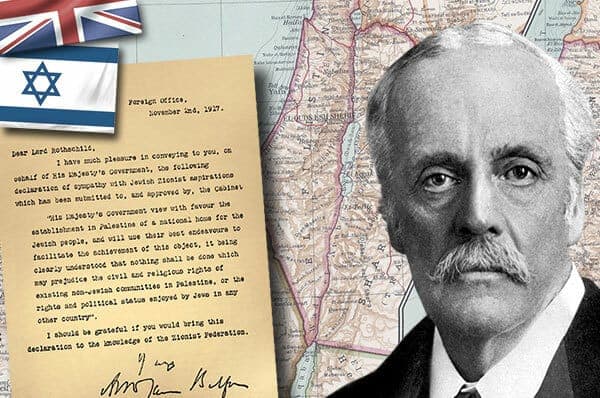The Balfour Declaration 1917
The Balfour Declaration, issued by the British government in 1917, supported the creation of a national home for the Jewish people in Palestine, significantly impacting the direction of Zionist dreams and laying the foundations for the establishment of Israel. The declaration was seen as a tactical move during World War I to gain support from Jewish communities globally and secure influence in the Middle East. The historical background, formulation, execution, and consequences of the Balfour Declaration gain insights into the intertwined narratives of Zionism, the Arab-Israeli conflict, and the ongoing pursuit of peace and fairness to Palestinians.
FACTSHEET
By Abbi


. The Balfour Declaration, a significant paper in the narrative of Zionism, surfaced during the turbulent era of World War I and the fading Ottoman Empire. In 1917, the British government issued a declaration expressing its support for the creation of a national home for the Jewish people in Palestine.
. The reverberations of its impact extended well beyond its original purpose, influencing the direction of Zionist dreams and establishing the foundations for the establishment of Israel. In order to grasp the intricacies of the Balfour Declaration and its lasting importance, it is crucial to explore its historical background, formulation, outcomes, and the wider impact on the region.
. In 1917, the British government released the Balfour Declaration, endorsing the creation of a "national home for the Jewish people" in Palestine.
. In World War I, the Balfour Declaration was perceived as a tactical maneuver by the British to cultivate backing from Jewish communities globally and secure influence in the Middle East.
. The concept of Zionism arose towards the end of the 19th century as a political movement promoting the establishment of a Jewish homeland in Palestine, driven by increasing anti-Semitism and a longing for self-rule.
. Motivated by a turbulent past of oppression and upheaval, the Jewish diaspora aspired to find a safe homeland to safeguard their cultural heritage and worship freely.
. Prominent individuals like Arthur Balfour and Chaim Weizmann were instrumental in shaping the declaration, drawing inspiration from various motives, including political tactics and spiritual and cultural ambitions.
. Behind closed doors, British officials engaged in negotiations with Zionist leaders and prominent Jewish figures to carefully craft the wording and implications of the Balfour Declaration.
. The Balfour Declaration invoked varied responses worldwide, as certain nations backed the idea of creating a Jewish homeland, whereas others voiced reservations regarding its potential effects on the stability of the region.
. The declaration heightened tensions between Arab and Jewish communities in Palestine, forming the basis for an intricate and conflict-laden relationship that still influences the political landscape of the region to this day.
. Like many historical documents, the Balfour Declaration encountered its own set of challenges during its implementation. Transitioning from conflicting promises to both Jewish and Arab communities, while dealing with the intricacies of British colonial control, executing the written words into actual deeds posed a significant challenge.
Establishing the British Mandate in Palestine:
. After World War I, the British Mandate was implemented in Palestine, setting the Balfour Declaration in motion. During this period, a crucial point emerged in the history of the region when the British government assumed authority over the area, influencing the destinies of the Jewish and Arab Palestinian communities living there.
Effect on the Zionist Movement:
. The Balfour Declaration greatly boosted the Zionist movement by granting legitimacy to the establishment of a Jewish homeland in Palestine. It became a powerful call to action for Jewish communities around the world, inspiring them to persist in their efforts to create a future in the area.
. Thanks to the backing of the Balfour Declaration, there was a noticeable rise in both the quantity and extent of Jewish settlements in Palestine. The proclamation promoted Jewish migration to the area, resulting in the formation of fresh communities and strengthening the enduring connection of Jewish people to their so called historic homeland.
The legacy and controversies associated with the Declaration.
. The lasting impact of the Balfour Declaration resonates across the Middle East, influencing the region's geopolitical dynamics even in present times. The effect it has had on the Israeli-Palestinian conflict and wider regional dynamics highlights the enduring importance of this historic document.
. In today's world, the discussion surrounding the Balfour Declaration is still vibrant and contentious, reflecting a range of interpretations and viewpoints regarding its significance. The impact of the document on ongoing events and the lingering issues it has raised highlight the intricacies and obstacles involved in dealing with its aftermath today.
. The Balfour Declaration remains a crucial event in the evolution of Zionism, shaping the course of Jewish nationhood and the intricacies of the Middle East region. The lasting impact it leaves behind constantly ignites discussions and disagreements, highlighting the complex relationship between politics, diplomacy, and identity in the area.
. Through the creation, execution, and consequences of this declaration, significant observations regarding the intertwined narratives of Zionism, the Arab-Israeli conflict, and the continuous quest for harmony, justice, and fairness for the Palestinians.
CPSC Solidarity
Working for peace, equality, and justice together.
Reach out
Sign up to receive regular updates
All enquiries:
© 2024. All rights reserved. Privacy Statment
quick links
